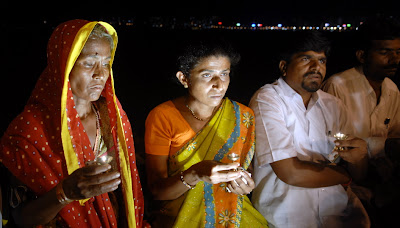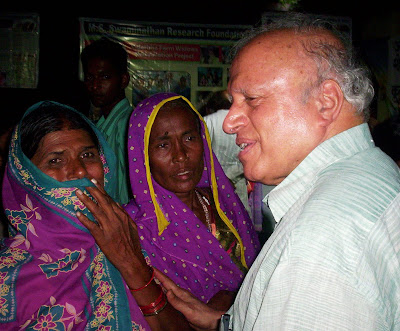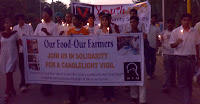
Farmers� Crisis � Realities of Rural India
-- Atul Dev This year the 2nd of October, Mahatma Gandhi�s birthday, saw a unique event around the world when over 1000 people of Indian origin gathered in small groups at 39 locations in the US to draw attention to the plight of and show solidarity with the farmers in their �homeland� by a candle light vigil. They were similarly joined by over 2000 people in similar small groups in 19 locations in urban India, to participate in the appropriately named event � �Our Food, Our Farmers�. This unique style of satyagraha would have delighted Mahatma Gandhi even more than the United Nations� declaring October 2nd as the International Day of Non-Violence. Organised by an international NGO, Association for India�s Development (AID), they expressed their support to the farmers and their displeasure with government policies that have resulted in numerous suicides by farmers in India. The message was straight -- �Thousands of suicides, hundred of millions in distress, the farmers' crisis is unacceptable!�
Punjab, Haryana, Andhra Pradesh, Karnataka, Kerala, Maharashtra, amongst others are India�s more prosperous states, with a rich output of food as well as commercial crops, industrially vibrant, politically aware, technologically and financially sound. Yet in their villages the poor farmer or tiller of the land is taking the easy, but unfortunate, way out of a serious crisis.
Even as the organisers are deeply moved by the continuing spate of farmer suicides, 836 in Vidarbha alone in 2007, they strongly believe that the underlying causes need to be addressed to find a long term solution. About a couple of months ago, I had the opportunity of hearing journalist P. Sainath, who was awarded the 2007 Magsaysay Award, say at a function in New Delhi: �The tragic farmers' suicides are only a symptom of a much deeper rural distress. This is a result of a decade-long onslaught on the livelihood of millions by wrong policies of the government. The crisis goes way beyond the families ravaged by the suicides.� He was right. In the past few years, over 25,000 farmers have committed suicide. What is even more shocking is that the governments have ignored the repeated cries of distress of the rural masses. Sale of kidneys by farmers, sale of entire land holdings and suicide deaths of farmers are now common.
Government policies in the past 15 years have slowly removed support systems for Indian farmers while promoting unsustainable high cost agricultural practices that farmers cannot afford. All this has resulted in the farmers, particularly the cotton growers of Vidharba in Maharashtra, being unable to sustain themselves with the government laid down minimum support prices which do not cover the real cost of production. The farmers have gone from debt to deeper debt with no waiver in sight. The farmers have been demanding waiver of debts and proactive support to low cost sustainable agriculture inputs as a means to end their plight. The governments, central or state, have not yet responded. The end result is the spate of suicides in the community.
Impracticable policy decisions, lack of access to affordable credit, greedy and corrupt middlemen and indifferent official response are among the factors that have pushed farmers to this breaking point. When Prime Minister Dr Manmohan Singh visited Vidarbha last July, the farmers there hoped that bad days were coming to an end and their destiny would be changing. They have been disappointed. As the fresh sowing season starts, worrying signs are already evident. On the other hand, the Maharashtra state government claims that the suicides in Vidarbha have declined due to the implementation of special relief packages!
Agriculture in India as well as elsewhere is an uneconomic activity per se. In USA and Europe, it is supported by government subsidies. The US and the European Union are subsidizing their farmers to the tune of $1 billion every single day; we in India are debating to bring agriculture under income tax net! The OECD has estimated that subsidising farmers produces a tax burden of $1,000 a year on each family of the US, the EU and Japan. But taxpayers there do not complain. If the American government can act for its farmers, why are central and state governments in India allowing the farmers to kill themselves in India?
In 1997, India experienced its first bout of farmers suicides. The crisis has stemmed from a number of hardships that have led to the irreversible indebtedness of small and medium farmers from India�s most productive regions. India�s agriculture has taken a downward trend due largely to three main factors -- rising costs of cultivation, plummeting prices of farm produce and lack of credit availability for small farmers. Most of these factors can be attributed to corporate globalisation and unjust free trade policies implemented by the World Trade Organisation (WTO); and official indifference and negligence have had their devastating effect too.
While nature�s unpredictability has been additionally detrimental to the welfare of farmers in some regions, these are challenges that farmers have been able to overcome in the past. Newer types of seeds and farm inputs, promoted by multinationals, have converted a once innovative and knowledgeable community into a community that can no longer work with the soil they know, but is now dependent on costly, artificial inputs with which they are unfamiliar.
In 1998, the World Bank�s structural adjustment policies forced India to open its seed sector to global agri-businesses. As a result of this adjustment, traditional farm saved seeds have been replaced with genetically engineered seeds that are non-renewable, thus requiring repurchase for each growing season. What was once a self-renewing resource has now become a corporate commodity and a costly investment which farmers must make every season. While subsidies may provide limited assistance to some farmers, growers of cotton and chilli do not enjoy any government subsidies. These farmers buy highly priced seeds and pesticides from private suppliers and if the seeds fail to germinate they rarely get compensation.
Most importantly, agriculture must return to a farmer-friendly policy rather than its current bias towards corporations. It is only when this ideal is achieved that farmers will regain control of their own lives, financially and mentally. Humiliation resulting from harassment by moneylenders is the main reason for farmers� suicides.
Nearly half of Indian farmers are crippled by debt. Average debt of an Indian farmer household is Rs 12,585. Small farmers in all regions of the country owe lakhs of rupees because institutional loans, which have fixed interest ceilings of no more than 14 percent, only provide for about 10 percent of their credit needs. The other 90 percent of small to marginal farmer loans come from private moneylenders who are infamous for constantly harassing their �clients� in order to enjoy heavy profits of the 24-60 percent interest that they charge on their loans. When their crops fail time after time regardless of the money the farmers have invested in fertilizers, pesticides and bore wells, there is no profit to be seen and no conceivable way to repay their lenders.
It is therefore not surprising that loans taken from private moneylenders are the most difficult for farmers to pay. While some states have attempted to ban exorbitant interest rates implemented by private moneylenders, their effectiveness is questionable. This will continue as long as farmers depend on private loans where there are no written agreements regarding interest ceilings. When the harassment persists, many farmers become emotionally fatigued and consequently end their lives in the hope that the meager relief package provided by the government will give their family hope of a better future. Currently, many states offer financial relief packages only to the families of deceased farmers who were unable to manage payments on their bank loans while alive!
Although India has been a frontline crusader in the global battle to protect the livelihoods of small farmers, its government�s response on a domestic level has unfortunately been a different story. Thus, instead of changing agricultural policies, officials have made unhelpful recommendations suggesting that farmers boost their self-reliance and self-respect. Instead of addressing the root of the problem, the government attributes the cause of farmers� suicides to peripheral problems. Continued ignoring of these facts will only result in failure to prevent a wave of suicides next growing season.
(Atul Dev is a New Delhi based senior freelance journalist. He can be contacted at: atuldev@airtelbroadband.in)
Copyright � 2005 Mauritius Times.
All rights reserved. Website designed and maintained by the Staff of Mauritius Times.








